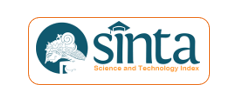Narasi sejarah yang tidak setara: mengurangi bias gender dalam buku teks sejarah Indonesia
Abstract
Keywords
References
Afrina, A., Abbas, E. W., & Susanto, H. (2021). The Role of Historical Science in Social Studies Learning Materials for Increasing Values of Student ’ s Nationalism. The Innovation of Social Studies Journal, 3(September), 1–8. https://doi.org/10.20527/iis
Amini, M. (2021). Sejarah Organisasi Perempuan Indonesia. UGM Press.
Atmosiswartoputra, M. (2020). Perempuan-Perempuan Pengukir Sejarah. Bhuana Ilmu Populer.
Badan Pusat Statistik. (2022). STATISTIK POLITIK 2022.
Creswell, J. W., & Creswell, J. D. (2018). Research Design (5th ed.). Sage Publications.
Crocco, M. S. (2018). Gender and Sexuality in History Education. In The Wiley International Handbook of History Teaching and Learning and Learning (Issue 2015, pp. 335–363). Wiley-Blackwell. https://doi.org/10.1002/9781119100812.ch13
Eko, B., Cahyono, H., Maruti, E. S., & Hanif, M. (2024). The honorific system in oral texts of historical site guardians in Madiun ( Indonesia ): a pragmasociostylistic perspective. Cogent Arts & Humanities, 11(1). https://doi.org/10.1080/23311983.2024.2360179
Fachrurozi, M., & Armiyati, L. (2020). Gender-Biased In The History Textbooks for XI Grade Students Senior High School. The Proceedings of the 4th International Conference of Social Science and Education, ICSSED. https://doi.org/10.4108/eai.4-8-2020.2302404
Gunawan, R., Lestariningsih, A. D., & Sardiman. (2017). Sejarah Indonesia Kelas X. Pusat Kurikulum dan Perbukuan, Balitbang, Kemendikbud.
Hasan, S. H. (2019). Pendidikan Sejarah untuk Kehidupan Abad Ke 21 M. Historia: Jurnal Pendidik Dan Peneliti Sejarah., 2(2), 61–72. https://doi.org/10.17509/historia.v2i2.16630
Pengarusutamaan Gender Dalam Pembangunan Nasional, Pub. L. No. 9, 1 (2000). https://www.djkn.kemenkeu.go.id/pug/assets/files/informasi/Inpres_No.9_Thn_2000_-_PUG_dalam_Pembangunan_Nasional.pdf
Iskantini, E. (2022). Women ’ s Narrative in High School History Textbooks. International Seminar on Social Studies and History Education, 2(1), 353–363.
Jiva, M., Wicaksono, A., & Nurmila, N. (2021). Critical Discourse Analysis of Gender Construction on Islamic History Content in the Islamic Religious Education Textbook for Junior High School. Jurnal Pendidikan Agama Islam, 18(2), 475–492. https://doi.org/10.14421/jpai.2021.182-14
Khan, S. B. A. L. (2017). Sovereign Women in a Muslim Kingdom. The Sultanahs of Aceh, 1641–1699. NUS Press.
Košir, S., & Lakshminarayanan, R. (2023). Do visual constructs in social science textbooks evince gender stereotypes and bias ? A case study from India. Gender and Education, 32(5), 69–88. https://doi.org/10.1080/09540253.2022.2144626
Levstik, L. S., & Barton, K. C. (2022). Doing history: Investigating with children in elementary and middle schools. Routledge. https://doi.org/10.4324/9781003179658
Lucy, L., Demszky, D., Bromley, P., & Jurafsky, D. (2020). Content Analysis of Textbooks via Natural Language Processing : Findings on Gender , Race , and Ethnicity in Texas U . S . History Textbooks. AERA Open, 6(3), 1–27. https://doi.org/10.1177/2332858420940312
Marsudi, G. A., Wulandari, K., & Mayangsari, W. (2023). Peran Ganda Istri dalam Meningkatan Ekonomi Keluarga (Studi Deskriptif Pekerja Perempuan Peternakan Ayam Petelur di Desa Kandangan, Kecamatan Srengat, Kabupaten Blitar). Jurnal Wanita Dan Keluarga, 4(1), 55–66. https://doi.org/10.22146/jwk.7497
Melati, N. K. (2022). Her Story: Perempuan Nusantara di Tepi Sejarah. Elex Media Komputindo.
Melinda, C., & Supriatna, N. (2024). PEDAGOGI FEMINIS DALAM PEMBELAJARAN IPS. Journal Education Innovation (JEI), 2(3), 320–327. https://jurnal.ypkpasid.org/index.php/jei/article/view/78
Moleong, L. J. (2021). Metodologi Penelitian Kualitatif. Remaja Rosdakarya.
Mulyana, A. (2013). NASIONALISME DAN MILITERISME: IDEOLOGISASI HISTORIOGRAFI BUKU TEKS PELAJARAN SEJARAH SMA. Paramita, 23(1), 78–87. https://doi.org/10.15294/paramita.v23i1.2498
Nordholt, H. S., Purwanto, B., & Saptari, R. (2013). Perspektif baru penulisan sejarah Indonesia. Yayasan Pustaka Obor Indonesia.
Nuruddin. (2024). SERPIHAN SEJARAH LOKAL GRESIK - Dari Kota Bandar Menjadi Destinasi Wisata di Masa Kolonial Belanda. Airlangga University Press.
Offermann, L. R., & Foley, K. (2020). Is There a Female Leadership Advantage? In Oxford Research Encyclopedia of Business and Management. https://doi.org/10.1093/acrefore/9780190224851.013.61
Ortega-Sánchez, D. (2019). Teaching Gender in the History Classroom : An Investigation into the Initial Training of Primary Education Teachers. Education Science, 9(114), 1–12. https://doi.org/10.3390/educsci9020114
Pedoman Pelaksanaan Pengarusutamaan Gender Bidang Pendidikan, Pub. L. No. 84, 1 (2008). https://sma.kemdikbud.go.id/data/files/Permendiknas Nomor 84 Tahun 2008 Tentang Pedoman Pelaksanaan Pangarusutamaan Geder.pdf
Pospelova, I. (2024). Masculinity/Femininity As A Gender Characteristic In The Prediction Of Various Personality Dependences. Social Inquiry into Well-Being, 22(1), 121–139. https://doi.org/https://doi.org/10.13165/SD-24-22-1-07
Purwanto, B. (2006). Gagalnya Historiografi Indonesiasentris. Ombak.
Rahmani, I. L., Meliana, R., & Triyono, S. (2024). Dissecting Gender Bias : Critical Discourse Analysis of Advertisements in Indonesia. Journal of Pragmatics and Discourse Research, 4(02), 180–193. https://doi.org/10.51817/jpdr.v4i2.933
Raihan, C. S. (2021). Mengenal Datu Beru, Sosok Pahlawan Wanita dari Tanah Gayo. https://detakusk.com/artikel/kilasan-mengenal-datu-beru-sosok-pahlawan-wanita-dari-tanah-gayo
Riezal, C., Joebagio, H., Purwasito, A., & Djono. (2020). Gender Issues Historical Education Curriculum Development (Case as Study at Syiah Kuala University Banda Aceh). In The 5th International Seminar On Social Studies and History Education (ISSSHE) “Promoting Global Competency in the Era of the New Normal in Social Studies and History Learning” (pp. 77–89). Universitas Pendidikan Indonesia.
Setiadarma, E. G. (2021). HOEDJIN: Eksplorasi Metode Penulisan Sejarah Perempuan. Jurnal Sejarah, 4(1), 1–13. https://doi.org/10.26639/js.v4i1.318
Sholikah, M., & Cholil, M. (2020). Analisis Bias Gender Pada Soal Ujian Bahasa Arab di Madrasah Tsanawiyah. An Nabighoh, 22(2), 191–210.
Sondarika, W. (2017). PERANAN WANITA DALAM PERJUANGAN KEMERDEKAAN INDONESIA MASA PENDUDUKAN JEPANG. HISTORIA, 5(2). https://doi.org/http://dx.doi.org/10.24127/hj.v5i2.958
Sudirman, F. A., & Susilawaty, F. T. (2022). KESETARAAN GENDER DALAM TUJUAN PEMBANGUNAN BERKELANJUTAN (SDGs) : SUATU REVIUW LITERATUR SISTEMATIS. Journal Publicuho, 5(4), 995–1010.
Ulfa, F., Mukaromah, N., & Puspitasari, D. (2023). Gender Bias Analysis and Right to Fight for Gender Equality in Education through the Children’s Book “I AM KARTINI.” Berumpun: International Journal of Social, Politics, and Humanities, 6(2), 112–127. https://doi.org/10.33019/berumpun.v6i2.114
Utama, T. R., Suyahmo, S., & Purnomo, A. (2023). Integration of Gender Equality Values Through Innovative Development of Interactive E-Modules in Social Studies Subject. Journal of Educational Social Studies, 12(2), 119–127. https://doi.org/10.15294/jess.v12i2.75804
Utami, I. W. P. (2021). Colonialism , Race , and Gender : A Multimodal Analysis of an Indonesian Textbook. Jurnal Sejarah, 4(1), 68–82. https://doi.org/10.26639/js.v4i1.327
Wiriaatmadja, R. (2002). Pendidikan sejarah di Indonesia : Perspektif lokal, nasional, dan global. Historia Utama Press.
Wulandari, A. (2020). Menghadirkan perempuan dalam historiografi pasca merdeka: membangun karakter bela negara melalui narasi sejarah. Jurnal Pertahanan Dan Bela Negara, 10(2), 133–150. https://doi.org/10.33172/jpbh.v10i2.864
Yoon, M. Y. (2019). Gender equality in politics at home and promotion of gender equality in politics abroad: The role of bilateral official development assistance. International Political Science Review, 40(2).
Yulia, D. (2016). Perspektif Gender Dalam Historiografi Indonesia. Jurnal Dimensi, 5(2), 1–6. https://doi.org/10.33373/dms.v5i2.12
Yuliati, Khakim, M. N. L., & Towaf, S. M. (2020). Gender-Based Women’s History Learning as an Effort to Answer the 21st-Century Challenge. Advances in Social Science, Education and Humanities Research, 404(Icossei 2019), 246–250. https://doi.org/10.2991/assehr.k.200214.043
DOI: http://dx.doi.org/10.17977/um0330v7i2p%25p
Refbacks
- There are currently no refbacks.

This work is licensed under a Creative Commons Attribution-ShareAlike 4.0 International License.
Editorial office:
History Department, Faculty of Social Science,
Universitas Negeri Malang
Jl. Semarang No.5 Kota Malang 65145,
Phone. (0341) 551312,
email: jpsi@um.ac.id
Website: http://journal2.um.ac.id/index.php/sejarah/index
E-ISSN 2622-1837

This work is licensed under a CC BY SA 4.0.








